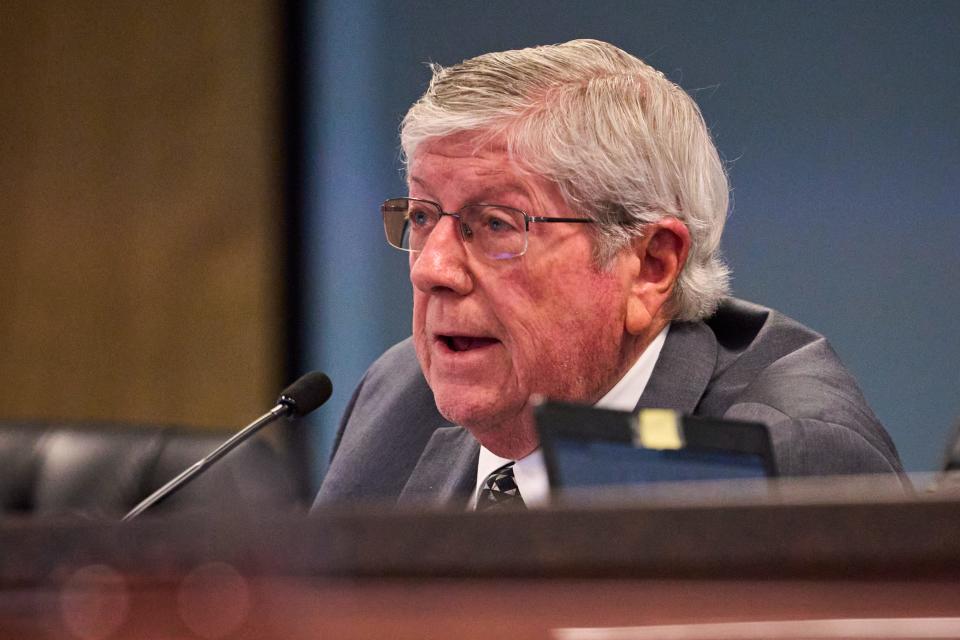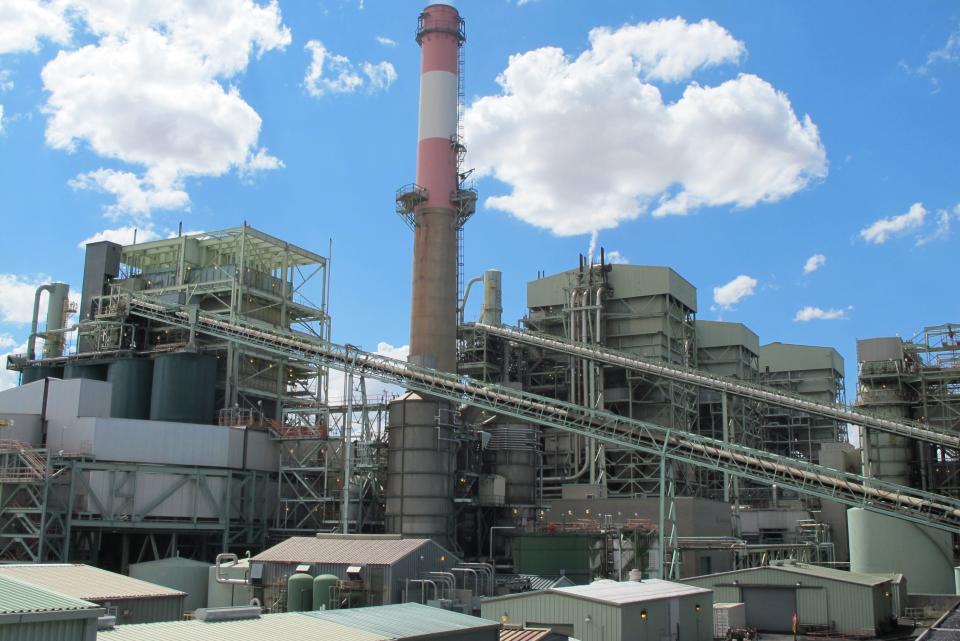Arizona coal plant communities lose out on millions in economic transition funding
Communities economically reliant on the Cholla Power Plant, located between Winslow and Holbrook just south of the Navajo Nation, will not receive utility ratepayer funds to jumpstart their economic transition as the plant's closure looms.
The Arizona Corporation Commission's decision on Feb. 23 wrapped a nearly two-year rate case that included whether Arizona Public Service Co.'s customers should be responsible for financially supporting rural communities coping with Cholla's 2025 closure.
If the commission had approved the funding requested by APS and other entities, the utility would have paid millions through its ratepayers, including:
More than $90 million to the Navajo Nation over 8.5 years, including $3.75 million over three years to support home and business electrification.
$38.9 million to the Hopi Tribe over 10 years.
$20 million to Joseph City Unified School District over 10 years.
$5.4 million to Navajo County communities over three years.
The commission's decision puts greater pressure on local officials to find other opportunities to spur economic development as the closures of coal power plants serving Arizonans approach. The Coronado Generating Station in St. Johns, the Springerville Generation Plant and the Four Corners Power Plant are scheduled to shut down operations by 2032.
"We're disappointed that it went the other way," said George Hardeen, a spokesperson for the Navajo Nation Office of the President, in a statement. "It's the Navajo Nation's position that the funding for coal community transition is, in fact, properly recoverable from ratepayers as part of the costs of service directly caused by the early closures of the power plants."
In late January, an administrative law judge ruled that the distribution of transition funding was inappropriate because the Arizona Corporation Commission "has been and continues to be unable to determine what is a fair share" of coal community transition "financial assistance to impose upon ratepayers."
In a Feb. 23 news conference, Arizona Corporation Commission Chair Jim O'Connor said putting ratepayers on the hook for economic transition support wasn't fair.

"If the federal government writes that check, that burden is shared with everybody in America. If the governor ... writes that check, at least everybody in Arizona puts in a dime or a dollar, equally," O'Connor said. "That's an appropriate shared burden. To burden individual ratepayers with that obligation is totally inappropriate."
Commissioner Kevin Thompson released a statement after the rate case vote giving the commission's rejection of coal community transition funds as an example of savings for ratepayers. Even without the coal community transition funds, the aspects of the rate case that were approved will boost the average residential APS bill by about 8%.
Amanda Ormond, director of Arizona State University's Just Energy Transition Center, said the commission's debate over Arizona ratepayer responsibility for funding coal community transitions started in 2019. During a rate case with Tucson Electric Power, the commission expressed an intention to create standards regarding transition funding but did not fulfill its promise, Ormond said.
"It's been five years, and the Corporation Commission has not decided what to do," Ormond said. "They basically have punted on addressing this issue that grows, that affects more and more people."
She is of the opinion, she said, "that it's completely appropriate for ratepayers that benefited from these plants providing cheap electricity for decades to be able to provide some glide path to new economic future."
As coal plants leave, communities look for new economic opportunities
Most Cholla Power Plant employees will stay with APS but move to a different location, according to Derron Hansen, the assistant business manager of utility union IBEW 387. Union employees were offered two options, Hansen said: a $10,000 redeployment package to relocate to another APS plant or a severance package worth a year's salary to stay at Cholla until their unit closed down.
Hansen is a native of Joseph City, the unincorporated Navajo County community home to the Cholla facility. He worked as a control operator there for 15 years before relocating to Phoenix. He said he has seen Cholla's impending closure break up his family and community.
"If there's no future in the job I got, and this other opportunity came up, but it's in the Valley, then what do I do? So I accepted it, but I left my family there," said Hansen, who has a son who's finishing high school. Even though it was just a few families moving away, it's a big deal when there's only a few families up there in the first place."

Superintendent Bryan Fields of Joseph City Unified School District said the consequences could be "detrimental" if the district does not receive financial support in the next few years.
Joseph City Unified has been expanding its bus routes to mitigate the loss of students due to Cholla's closure. But Fields said these efforts may not be enough to preserve educational programs.
Officials in Navajo, Coconino and Apache counties are collaborating on grant applications and creating an economic transition strategy, said Chris Pasterz, Navajo County's economic development director.
"We started seeing these dominoes falling," Pasterz said. "If we, as a county, don't ... get ourselves organized and prepared, nobody else is going to do it for us."
The three counties, along with utility companies, nonprofits and other groups, have joined a nationwide initiative called Building Resilient Economies in Coal Communities.
Through the initiative, the counties plan to host community meetings with grant writers and prompt job growth through infrastructure projects related to housing, water and roads, Pasterz said. In addition, the counties aim to diversify their economies by investing in meat processing, the lumber industry, and renewable energy sources like biomass, he said.
"There aren't these huge microchip processing plants like you see down in Maricopa. But the way that we can rebuild our economy here is to get base hits, things that are important to us," Pasterz said. "Might be a little bit of housing project here, might be a small manufacturing facility here, might be a roads improvement here or a water upgrade here. But those projects create base hits, which then allow us to move our economy forward."
Although the commission did not support the coal community transition proposal, the utility has allocated about $11 million to help communities affected by coal plant closures, said APS spokesperson Mike Philipsen.
"We will continue to act as a partner to these communities in seeking to achieve a sustainable transition away from coal-fired resources," Philipsen said.
Reach the reporter at alexis.waiss@gannett.com.
This article originally appeared on Arizona Republic: Arizona coal communities won't get APS customer dollars. Why?

